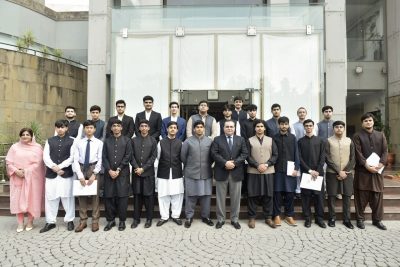
The Pakistan Institute for Parliamentary Services (PIPS), under its commitment to parliamentary excellence, successfully organized a comprehensive five-day Orientation Workshop for the second batch of interns of the National Assembly of Pakistan from June 23rd to 27th, 2025, at its headquarters in Islamabad. The initiative, part of PIPS’ broader effort to build capacity and awareness among Pakistan’s emerging youth leaders, brought together a group of young professionals for a unique, immersive exposure to parliamentary functions, constitutional frameworks, and democratic governance.
The orientation programme aimed to deepen the interns’ understanding of the institutional processes and legislative practices of the National Assembly. Designed as an interactive and intellectually engaging experience, the workshop featured a series of expert-led sessions on themes ranging from constitutional law and parliamentary procedures to digital democracy, fiscal governance, and the importance of youth engagement in shaping democratic institutions.
The first day began with formal registration, followed by the recitation of the Holy Quran and the national anthem. Representatives from the Parliamentary Development Programme (PDP) Wing of PIPS offered an introductory overview of the orientation programme and facilitated a group photograph to mark the beginning of the cohort’s learning journey. The morning session, led by Mr. Muhammad Usman Ali Ansari, Joint Secretary at the National Assembly Secretariat, offered a comprehensive look into the structure, powers, and processes of Parliament, setting a strong foundation for the week. This was followed by two sessions led by Sheikh Sarfraz Ahmed, Senior Legislative Consultant, on the Constitution of the Islamic Republic of Pakistan and the Rules of Procedure and Conduct of Business in the National Assembly, emphasizing the legal and procedural frameworks that guide parliamentary conduct. The final session of the day, delivered by Prof. Dr. Farooq Ahmad Dar from Quaid-i-Azam University, traced the historical evolution of democracy, contextualizing Pakistan’s democratic journey within global and regional developments.
Day Two expanded upon structural and ideological themes. Mr. Zafarullah Khan, a renowned parliamentary expert, discussed federalism in Pakistan, explaining its constitutional foundations, administrative challenges, and the role of provinces in maintaining a balanced federation. The next session, conducted by Syed Shamoon Hashmi, Special Secretary at the National Assembly Secretariat, explored emerging trends in global democracy and the vital role of young citizens in defending democratic values amidst current political transitions. The post-lunch sessions focused on institutional tools: Mr. Asad Ali Maan, Additional Draftsman at the National Assembly, presented a detailed briefing on parliamentary oversight mechanisms, emphasizing their importance for government accountability. Later, Honourable Sher Ali Arbab, Member of the National Assembly, delivered an engaging talk on digital democracy, exploring how technology can amplify youth engagement while also underscoring the responsibilities that come with digital activism.
Day Three provided a more technical exploration of legislative drafting and economic literacy. Ms. Naveen Erum, Additional Draftsman at the National Assembly Secretariat, explained the legislative process from bill to act, including the stages of bill introduction, committee deliberations, and final passage. This was followed by a futuristic and highly interactive session by Mr. Ali Raza, Senior Technologist at Code for Pakistan, titled “Thriving in the Age of AI,” which addressed how artificial intelligence is shaping policymaking, governance, and employment landscapes. The day concluded with a session by Dr. Wasim Shahid Malik, an expert in fiscal risk management, who demystified the budget process and introduced key financial indicators, allowing interns to better understand public finance and legislative scrutiny.
Day Four centered on power dynamics, research, and the challenge of misinformation. Senator Farhatullah Babar, a respected voice on constitutional matters, delivered a powerful lecture on the trichotomy of power, focusing on the separation and balance among the legislative, executive, and judiciary branches. This was followed by a critical discussion on the use of social media and combating misinformation, led by Mr. Usman Zafar, a Safe Digital Environment Specialist with UNDP. He highlighted both the power and risks of digital platforms, urging participants to be discerning, ethical, and responsible in their online engagements. In the afternoon, Ms. Nighat Paristan, Director of Research at the National Assembly Secretariat, presented an overview of parliamentary research processes and outputs, demonstrating how research underpins evidence-based policymaking. Ms. Nighat Siddiqui, Additional Secretary from the Election Commission of Pakistan, concluded the day with a session on citizen participation and electoral engagement, reinforcing the democratic right to vote and remain politically informed.
The final day, Day Five, brought the week to a meaningful close. Honourable Sharmila Farooqi, MNA, presented a compelling case study on pro-people legislation, focusing on the Age of Consent Bill, which sparked thoughtful dialogue on legislative advocacy for vulnerable populations. Dr. Muhammad Fahd Amin from QAU moderated the session, encouraging interns to reflect on the policy implications of legislative action. Later in the day, Mr. Danish Ali Bhutto, Deputy Director at the National Assembly Secretariat, prepared the interns for a mock parliamentary session, allowing them to apply their learning in a simulated legislative environment. The final segment featured an interactive “Bridging the Gap” dialogue with Parliamentarians, including Hon. Shaza Fatima Khawaja and Hon. Romina Khursheed Alam, who generously shared their experiences as legislators and answered questions from interns on policymaking, leadership, and political challenges.
The programme formally concluded with expressions of gratitude from the organizing team and participants alike. The interns praised the workshop for its content-rich sessions, diversity of expert speakers, and hands-on engagement opportunities. In turn, PIPS reaffirmed its commitment to developing informed, civic-minded youth capable of contributing to Pakistan’s democratic future.
This orientation workshop not only strengthened the interns’ understanding of parliamentary processes but also cultivated their confidence and curiosity to actively participate in national discourse. The initiative stood as a testament to PIPS’ role in nurturing the next generation of democratic leaders through education, exposure, and empowerment.